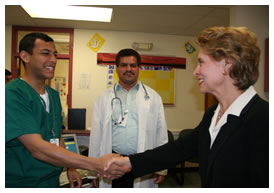
Health care is a basic right, not a perk.”
Health Care
Governor Chris Gregoire believes all Washingtonians should have access to high-quality, affordable health care. Healthy people are the backbone of a productive and vibrant community. With strong leadership, we can make sure the health care needs of all our residents are met. With our internationally recognized research and high-tech institutions, our state is well positioned to lead the nation in disease management and prevention.
The Governor’s health care strategy is based on these steps:
Increase access to health care and prescription drugs
Provide all children with access to health care — no child should go without. Since Gregoire took office, she has increased enrollment in her Apple Health for Kids program – which provides health insurance to low-income children – by more than 140,000.
Increase health care access, especially in rural Washington. The Governor has invested in the recruitment and training of an adequate health care workforce, including primary care physicians.
Provide equal access to mental health services. Governor Gregoire championed legislation requiring insurance companies to cover mental health care services to the same extent that they cover other medical services.
Create a program to reduce the cost of prescription drugs for the uninsured and underinsured. Since Governor Gregoire developed the program in 2005, more than 132,000 Washingtonians have received enrolled, helping them save almost $10.4 million.
Improve our health
Lead in tobacco prevention and control. Washington has the sixth-lowest smoking rate in the country. Data indicates that the smoking rate has dropped to 15.3 percent and we will save $2.8 billion in future health care costs as a result of this work.
Challenge Washingtonians to exercise regularly and improve their health by launching the Governor’s Community Health Bowl in 2005 in partnership with the Washington Health Foundation. Hundreds of community organizations, schools, businesses and others participate in this education campaign.
Create a health care system that works
Commit to improve the affordability and quality of our health care system. Governor Gregoire believes state government should serve as a model in the marketplace. To do this, in 2005 she implemented a five-point health care plan that includes:
Using evidence-based medicine to ensure that patients receive health care that works;
Expanding chronic care management to better serve the 5 percent of patients who use 50 percent of our health care resources;
Emphasizing health promotion and prevention;
Using health information technology; and
Increasing data transparency to give consumers better information about health care costs and quality.
Significant progress has been made. Governor Gregoire implemented a one–of–a–kind program to pay for new and emerging technologies that work and are safe for patients. Already, seven major technologies have been reviewed by a panel of expert clinicians, which determined that several were not safe, clinically effective or cost effective. The Governor has also funded grants to local providers so that they can set up health information technology systems.
Ensure safe, high-quality health care providers
Improve patient safety and reform the civil justice system for medical liability. Medical malpractice lawsuits can drive up the cost of care, so Governor Gregoire negotiated a breakthrough agreement in 2006 among lawmakers and the medical, insurance and legal communities.
Ensure that patients have access to safe, high-quality health care providers. Governor Gregoire issued an executive order that directed the Department of Health and the professional disciplinary boards to adopt uniform sexual misconduct rules. She also signed legislation requiring them to adopt uniform sanctioning guidelines for providers who exhibit unprofessional conduct or substandard care. Under Governor Gregoire’s leadership, the state has expanded professional and criminal background checks for anyone seeking a health care license in our state.
Additional Resources
Petition to have marijuana and related items removed from Schedule I and rescheduled as “medical cannabis” in Schedule II
Letter from Governors Lincoln Chafee and Chris Gregoire | Exhibit A | Exhibit B | Combined document | Drug Enforcement Administration accepts petition | Letters in support of petition: Governor of Hawaii, Mayors with Association of Washington Cities, San Juan County Prosecutor and Suburban Cities Association (SCA) | SCA Resolution